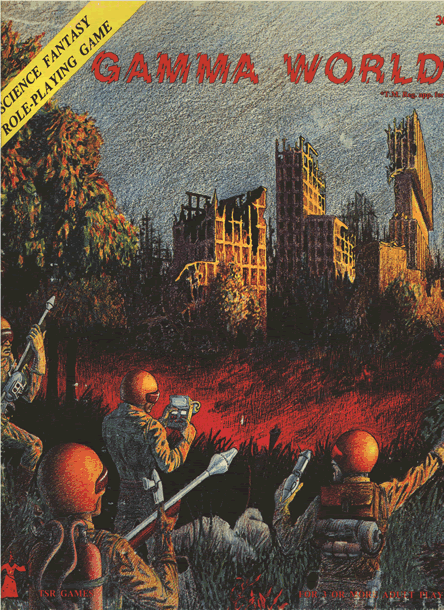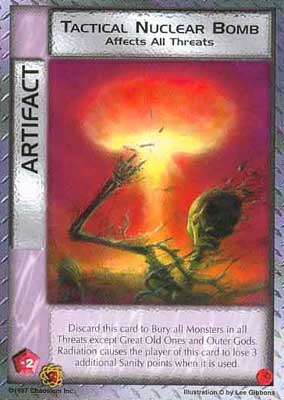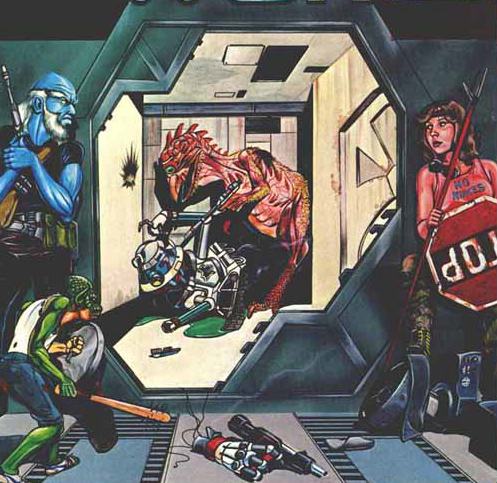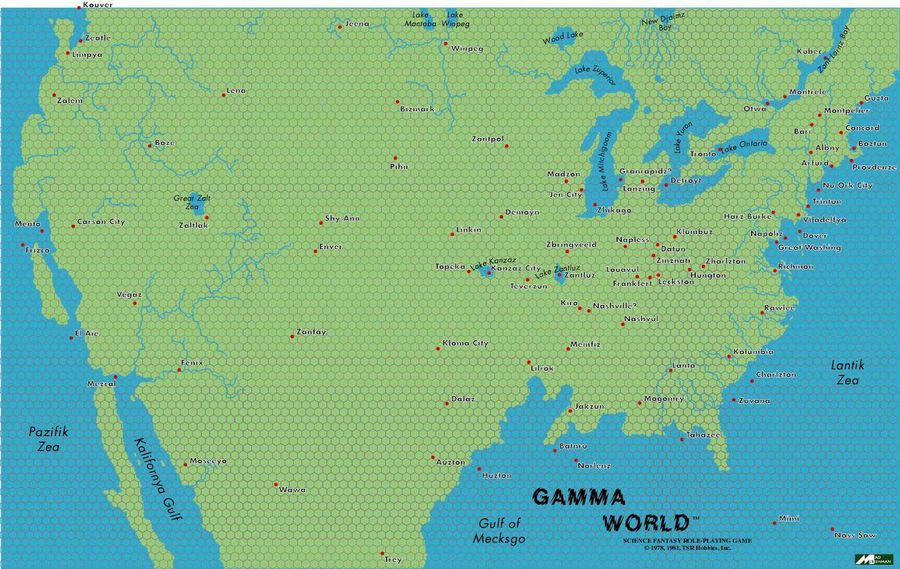GAMMA WORLD

GAMMA WORLD

|
|
|
|
|
|
|
|
|
|
|
|
INTRODUCTION +
HOW TO USE THIS BOOK +
Suggested Additional
Equipment +
Dice in GAMMA WORLD
+
DESIGNING GAMMA WORLD +
Settlements +
Ancient Areas +
Other Suggestions +
The First Scenario
+
CREATING CHARACTERS +
Character Types +
Basic Attributes +
NPCs and Creatures
+
Hopeless Characters
+
MUTATIONS +
Physical Mutations
+
Mental Mutations +
Plant/Vegetable Mutations
+
Creating NPC Mutations
+
PLAY OF THE GAME +
Time, Movement, and
Turn Length +
Combat +
Encounters +
The Creatures +
Cryptic Alliances +
Hazards +
Artifacts and Equipment
+
Standard Devices, Units,
and Materials +
Trade, Value, and Exchange
+
Healing of Body Damage
+
Relatives +
Languages +
Robotic Units +
Experience +
EXAMPLE OF PLAY +
Sample World Design
+
Starting the Campaign
+
Example of a Referee
Moderating an Adventure +
Note: A number of pages at the end of this
booklet are designed as reference aids and are perforated for easy removal,
if desired.
INTRODUCTION

Man, from Australopithecus africanus
and homo erectus erectus to homo sapiens
sapiens,
may have existed on earth for hundreds
of
thousands, perhaps millions of years.
During this time, one skill,
one particular talent has set him apart
from every other creature --
the ability to conceive and create tools.
Indeed, man has
been defined as the "tool-making animal".
From chipped rocks && polished
bones to neutron bombs and
computers, man has constantly been redesigning,
improving, and
refining his tools to meet his ever-changing
needs. Some have been
toys for children. Some have improved
his life style. Others have
been necessary for his survival. A few
have nearly caused his extinction.
Early in the 24th century, mankind's existence
was unparalled.
The rape of the earth's beauty and resources
in the late 20th and
early 21st centuries had been halted and
reversed, due to man's
tools. Yet, in spite of these tools
(or perhaps because of them),
the idyllic life of the 24th century came
to an abrupt end.
Having conquered the rigors of simple survival,
man was able to
turn his energies to more esoteric considerations
-- theology,
political ideology, social and cultural
identification, and development
of self-awareness. These pursuits were
not harmful in themselves,
but it soon became fashionable to identify
with and support
various leagues, organizations, and so-called
"special interest groups."
With the passage of time, nearly all the
groups became
polarized, each expressing and impressing
its views to a degree
that bordered on fanaticism.
Demonstrations, protests, and debates
became the order of the day.
Gradually enthusiasm changed to mania,
then to hatred of those who held opposing views.
Outbreaks of violence became more frequent,
and terrorists
spread their views with bombs &&
guns.
Reconstruction of the events from 2309
to 2322 has been difficult
due to the lack of intact records, but
historians now generally mark
September 16, 2309 as the beginning of
the period now commonly
known as the Shadow Years. On that day,
some 5000 members
of the League of Free Men were staging
a demonstration for the
purpose of promoting their concepts of
a united world government.
At the height of their demonstration,
a small neutron bomb was
detonated in their midst, killing most
of the demonstrators. Rumors
held opponents of world government, a
group known as the Autonomists,
responsible for the terrorism, but no
guilt was ever proved.
The League of Free Men made no formal accusations,
but three
months later, on December 23, several
hundred known Autonomists
were assassinated in separate locations.
In addition, the three
main offices of the Autonomists were the
targets of the release of a
newly developed nerve gas. The nerve gas
was responsible for approximately
3000 deaths, the majority of which were
Autonomist
office personnel, but many of those killed
had no connection with
the Autonomists. Blame for the killings
was placed on the League,
but there was no proof. The failure of
official investigations to
convict the perpetrators of these mass
murders created a wave of
vigilante actions; retaliation followed
retaliation. The problem was
compounded as the terrorism spread across
national boundaries,
engulfing the world with bloodshed.
As the vigilante actions continued, various
governments
attempted to prohibit and disband suspected
terrorist organizations
, but these attempts only drove the groups
further underground
and polarized their supporters. This led
many countries to
declare martial law in a last desperate
effort to control their populations,
but the warring groups had grown too powerful.
They had too
many resources (both economic and political)
upon which to draw.
Although there are no records to substantiate
the accusations that
governments gave covert aid to certain
groups in order to change
the balance of power, circumstantial evidence
seems to indicate
that this did occur.
In the final months of the Shadow
Years, a new organization
calling itself The Apocalypse,
announced its xistence w/ the
now famous Ultimatum:
Peoples of the world
-- you appear bent upon the
destruction of a civilization
that has taken centuries to
build, and the extinction
of life on earth.
If that is your will ... so be it!
We, the Apocalypse, demand an immed. cessation
of this insane violence,
or we will end it for you
... with a force you cannot conceive.
We have the power!
The choice is yours!
The exact identity of
The Apocalypse was, and still is, unknown.
Some have theorized that the group was
composed of scientists.
Some believe it was a special military
group. Whatever its
constituency, few believed the ultimatum
when it was issued, and
the fighting continued. Five days later,
on April 17, at exactly 1200
GMT, the capital city of every nation
in the world was turned into a
crater of radioactive slag.
The Apocalypse spoke to the world one more time:
People of the world,
you have been warned.
We have the power!
The choice is yours!
Again, due to the lack of records, it is
not known how the location of
The Apocalypse base was discovered,
or who initiated the attack.
Some evidence indicates the action was
a joint effort by nearly all
the surviving terrorist factions and vigilante
groups -- united for
the first time in the Shadow Years. In
the end, though, a massive
attack was mounted against The Apocalypse
base. In TURN, The Apocalypse
retaliated with a fury
never b4 witnessed on the face of the Earth.
Oceans boiled,
continents buckled,
the skies blazed with the light of unbelievable
energies.
Suddenly it was all over.
The civilization of man had been slashed,
burned, crushed, and
scattered to the four winds. Whether The
Apocalypse had intended
to completely destroy all life on the
planet and had failed, or if they
simply had not enough power, is debatable.
Some scholars
contend that The Apocalypse voluntarily
stopped their promised
destruction when they witnessed the horror
they had unleashed
and then destroyed themselves. At this
time, and even now, the
question is moot.
What did matter was that man survived.
The Black Years that
followed the Shadow Years were spent struggling
to survive in a
suddenly savage and vastly changed world.
The process was a
painful one, filled with nearly as much
terror and violence as the Shadow Years.
The devastation wrought by The Apocalypse
had changed
the very fabric of life on earth. The
weapons and devices they used had
completely obliterated some forms of life.
Others were mutated to
the point where they could not be recognized
as what they had once
been. Man was not immune to these changes.
Through it all, the death, the pain, the
horror, and facing the
prospect of an unknown future, man searched
for his lost knowledge,
and struggled to regain his tools . .
. to rebuild a self-destroyed civilization.
During the Black Years, those who held the tools, held the power . . .
* * *
The year is now 2471. It is nearly impossible
to describe the vast
changes that have occured since the devastation
of the Shadow
Years.
The weapons which had wrought the destruction
were many and
varied. Targets were seared by lasers,
blasted by fusion devices,
and razed by new and unfathomable energies
developed in the final
months of the conflict. Only the most
highly fortified areas (military
headquarters, spaceports, and the like)
remained even partially
intact. Neutron bombs, unhindered by most
forms of shielding,
decimated those who remained within even
these strongholds,
leaving concrete and metal tombs housing
incredibly complex
equipment, now stilled for lack of human
guidance.
Many of the weapons used by The Apocalypse
were of a
biomagnetic nature and nearly all life
forms suffered some kind of
mutation. Perhaps the most prevalent and
startling change was the
development of latent mental abilities
(psionics) in nearly all
organic life, including man. This power
could range from simple
emotional energy to the ability to control,
even kill, other beings
with mental force.
The ecological balance of Nature was shattered
as violently
and suddenly as man's civilization. The
sudden extinction of some life
forms and the mutation of most others,
coupled with the lack
of man's intervention and attention (except
to his own survival needs),
generated a near world-wide wilderness
inhabited by savage
creatures, who, like man, were struggling
to survive.
The loss of so much of man's knowledge
and records has
shrouded the world in ignorance and superstition.
Areas containing
ruins of man's once great civilization
are often looked upon as
taboo -- "Death Lands" -- and the men
and women who once lived
there are referred to as the "Ancients,"
usu. with quasi-religious
overtones. Artifacts from the past may
be simple curiosities or
objects of terror.
The pockets of humanity that have survived
are few, scattered
throughout the world where a moment's
lack of caution may mean
instant and painful death. Men are highly
suspicious of strangers,
jealous of each other's possessions, and
clandestine organizations,
known as cryptic alliances, plot
and scheme against each
other. The smallest hint of the location
of The Apocalypse base,
lost now for decades, creates intensive
rival searches, for it is
rumoured that therein lies power -- power
to survive, power to control . . .
It is now the Black Years. This is the
bizarre and everchanging
world that you, the PC, are about to enter!
HOW TO USE THIS BOOK
GAMMA WORLD is a role-playing
game. One (or more)
of the participants acts as the referee,
creating a world in which the
players act out parts as in a book
or play, parts scripted by the referee
but formed and finalized by all participants.
The referee
presents the situations in which the players
are to adventure. In
each adventure, the players gain experience,
and hopefully,
valuable artifacts, which increase their
chances of survival (they are
occasionally killed) in GAMMA WORLD. An
interconnected series
of such adventures is called a campaign.
Since "new" characters
are, by game mechanics, relatively weak
and inexperienced, the referee should
plan to present smaller risks
and correspondingly small rewards at the
beginning of the
campaign, and increase the risks and rewards
as the PCs
become more powerful and experienced.
The players cannot
begin the game until the referee has completed
his design work. Once the referee had
made the necessary
preparations, the players create their
game personae, called
PCs,
as described under CREATING CHARACTERS.
After a
character has been est., the player is
responsible for keeping
records of his character's attributes
and possessions, as well as
notes and maps concerning areas which
his character has explored.
While these rules are
complete guidelines for conducting a
campaign, certain additional equipment
is necessary or helpful for
play of the game.
zb
Kevin Hendryx: A lot of contributions were made at each stage and there was not always a clear division of labor. The amount of work required might vary depending on the nature of the project, the completeness (or lack thereof) of the original design, and format requirements or other marketing aspects. Development also helped to proofread bluelines when Production was swamped; and Design or Production would help Development playtest when required. Everybody pitched in with less formal playtest sessions in the off-hours. Sometimes Development would have to create extra material to flesh out an incomplete design; I remember Evan Robinson and I compiling the clerical reference charts at the back of Deities & Demigods one Saturday afternoon. I designed the town sections of AD&D module A3 for commercial release and Paul Reiche largely rewrote the Gamma World: Legion of Gold module from a Gygax early draft, including designing from scratch all the three mini-adventures; I then extensively edited the whole from the separate raw drafts. (My original edited ms. was sold to a collector on the West Coast in 1998.)
- Grognardia (Interview
with Kevin Hendryx, Part I)

James
M: 5. A lot of your TSR work was for the Gamma World game.
How did you become involved
with it?
Was the game a particular
favorite of yours?
Paul Reiche III: I
love Gamma World because it didn't take itself too seriously, which has
always been important to me.
In fact, in many ways Gamma
World was more like our D&D campaigns that the official rules, because
we were always mixing robots, laser guns, and mutants into the traditional
fantasy ingredients.
Also, as the most junior
designer at TSR, I jumped at the opportunity to edit and "fill out" a Gamma
World module written by Gary Gygax and his son Luke.
As a reader and day dreamer,
I probably spend equal time in science-fiction, fantasy and post-holocaust,
so Metamorphosis Alpha && Gamma World were right up my alley.
Blackmoor too, I guess.
- Grognardia (Interview: Paul Reiche III)



![]()
Reduce - Reuse - Recycle